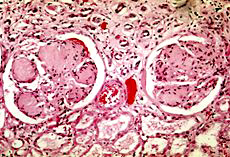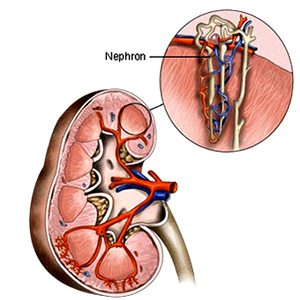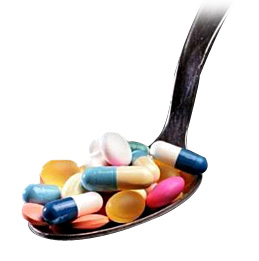
Apollo Gleneagles Hospitals
58 Canal Circular Road,
Kolkata - 700054, WB, India.
Contact : +91 9874167730 / +91 9830363642
Email : pchakrabarti@usa.net

Apollo Gleneagles Hospitals
58 Canal Circular Road,
Kolkata - 700054, WB, India.
Contact : +91 9874167730 / +91 9830363642
Email : pchakrabarti@usa.net
Diabetic Kidney Disease (Diabetic Nephropathy) :
DIABETIC NEPHROPATHY OVERVIEW —
People with diabetes have a lot to juggle when it comes to their healthcare. Having diabetes puts you at risk of other health problems, including heart attacks, strokes, vision loss, nerve damage, and kidney disease. While all of that may sound overwhelming, there is some good news; many of the steps you need to take to prevent one of those complications may actually help to prevent them all.
This article will discuss the early signs of diabetic kidney disease, or what healthcare providers call diabetic nephropathy. People who develop diabetic nephropathy usually have no symptoms early on, although the condition puts them at risk of developing more serious kidney disease. More detailed information is available by subscription.

The kidneys play an important role in the body:
they filter the blood, removing waste products and excess salt and water. If the kidneys become diseased, they falter in their task, leaving the blood polluted.
Finding out that you have early diabetic nephropathy can alert you that your kidneys are in danger. It is important to take steps to protect your kidneys before the problem advances. Information about advanced kidney disease is also available.
In some cases, diabetic nephropathy can eventually cause the kidneys to stop working altogether. If that happens to you, will need to have a kidney transplant or dialysis, a procedure that filters the blood artificially several times a week.
DIABETIC NEPHROPATHY SYMPTOMS
Diabetic nephropathy usually causes no symptoms, and people who have the condition often produce normal amounts of urine. To detect diabetic nephropathy, healthcare providers rely on tests that measure protein levels in the urine and blood tests to evaluate the level of kidney function.
When the kidneys are working normally, they prevent protein from leaking into the urine, so finding protein in the urine is a sign that the kidneys are in trouble. Often people who have diabetic nephropathy also have high blood pressure.
DIABETIC NEPHROPATHY RISK FACTORS
There are several factors that can increase your risk of developing diabetic nephropathy. These include:
DIABETIC NEPHROPATHY DIAGNOSIS - 
Urine tests are recommended once per year in people with type 1 diabetes, beginning about five years after diagnosis, and in people with type 2 diabetes, starting at the time of diagnosis.
The urine test is looking for a protein called albumin. If there is albumin (protein) in your urine, it means you have diabetic nephropathy. You may be told that you have "microalbuminuria". That simply means that you have trace amounts of protein in your urine, but it still means that you have nephropathy, assuming you do not have kidney disease caused by another condition.
The same urine test that is used to diagnose diabetic nephropathy will also be used to monitor your condition over time.
DIABETIC NEPHROPATHY TREATMENT -
People with diabetes often focus on keeping their blood sugar levels in the right ranges. And while it is important to control blood sugar, it turns out that controlling blood pressure is at least as important. That's because high blood sugar and high blood pressure work in concert to damage the blood vessels and organ systems.
For these reasons, the most important things you can do to stall kidney disease and protect against other diabetes complications are to:
Lifestyle changes -
Changing your lifestyle can have a big impact on the health of your kidneys. The following measures are recommended for everyone, but are especially important if you have diabetic nephropathy:
Manage blood sugar levels -
Keeping blood sugars close to normal can help prevent the long-term complications of diabetes mellitus. For most people, a target for fasting blood glucose and for blood glucose levels before each meal is 80 to 120 mg/dL (4.4 to 6.6 mmol/L); however, these targets may need to be individualized.
Manage high blood pressure -
Many people with diabetes have hypertension (high blood pressure). Although high blood pressure causes few symptoms, it has two negative effects: it stresses the cardiovascular system and speeds the development of diabetic complications of the kidney and eye. A healthcare provider can diagnose high blood pressure by measuring blood pressure on a regular basis.
The treatment of high blood pressure varies. If you have mild hypertension, your healthcare provider may recommend weight loss, exercise, decreasing the amount of salt in the diet, quitting smoking, and decreasing alcohol intake. These measures can sometimes reduce blood pressure to normal.
If these measures are not effective or your blood pressure needs to be lowered quickly, your provider will likely recommend one of several high blood pressure medications. Your provider can discuss the pros and cons of each medication and the goals of treatment.
A blood pressure reading below 130/80 is the recommended goal for most people with diabetic nephropathy.
Blood pressure medications — Most people with diabetic nephropathy need at least one medication to lower their blood pressure. Several medications can be used for this purpose, but a medication known as an angiotensin converting enzyme inhibitor (abbreviated ACE inhibitor) or a related drug known as an angiotensin receptor blocker (ARB) are used most commonly. ACE inhibitors are generally used first because they have been available longer than ARBs.
ACE inhibitors and ARBs are particularly useful for people with diabetic nephropathy because they decrease the amount of protein in the urine and can prevent or slow the progression of diabetes-related kidney disease. In fact, the kidney benefits of ACE inhibitors and ARBs are so robust that healthcare providers sometimes prescribe them for people with diabetic nephropathy who have normal blood pressure.
Still, despite their kidney-protecting abilities, ACE inhibitors and ARBs do have their downsides. For instance, ACE inhibitors cause a persistent dry cough in 5 to 20 percent of the people who take them. Some people get used to the cough; others find it so disruptive that they cannot continue taking an ACE inhibitor. For them, ARBs are often a good alternative, because ARBs are less likely to cause a cough.
In rare cases, you can have more serious side effects with ACE inhibitors and ARBs. These include a decrease in kidney function or a condition called hyperkalemia, in which too much potassium accumulates in the blood. To monitor for these and other side effects, healthcare providers sometimes run blood tests soon after starting these drugs. In some people, the medications will need to be stopped.
More information on the risks and side effects of ACE inhibitors and ARBs is available.
Monitor for signs of change — After beginning treatment and lifestyle changes to stall kidney disease, you will need to have repeat urine and blood tests to determine if urine protein levels have improved. If the urine protein levels have not improved or your kidney function has worsened, your healthcare provider may need to adjust your medications or recommend other strategies to protect your kidneys.
PREGNANCY AND DIABETIC NEPHROPATHY -
If you have diabetes and are interested in getting pregnant, it is important to talk with your healthcare provider well in advance, especially if you have diabetic nephropathy. Diabetes and its attendant problems can increase the risk of complications in pregnancy, especially in women with decreased kidney function. However, many women with mild diabetic nephropathy have normal pregnancies and healthy babies. To ensure the best outcome with a pregnancy, the most important thing you can do is to keep your blood sugar and blood pressure under tight control. However, women who are pregnant or attempting to get pregnant should not take ACE inhibitors or ARBs, as these drugs can cause birth defects. Instead, other medications (such as calcium channel blockers) are used during pregnancy to keep the blood pressure in check.
DIABETIC KIDNEY DISEASE AND OTHER DIABETES COMPLICATIONS -
If the steps you need to take to protect your kidneys sound overwhelming, keep this in mind; controlling your blood sugar and blood pressure can help to reduce the risk or severity of several other debilitating diabetes complications, including:
DIABETIC NEPHROPATHY PREVENTION -
The same measures that are used in the treatment of diabetic kidney disease are also useful in preventing it. That's true for the lifestyle choices mentioned above, as well as for the tight control of blood sugar levels and blood pressure.